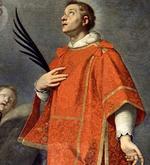Padre Pio Of Pietrelcina, Apostle Of The Confessional
by Unknown
Saint Pio of Pietrelcina was born on 25 May 1887 in Pietrelcina, Italy, to Grazio Forgione and Maria Giuseppa De Nunzio, and died on 23 September 1968 in San Giovanni Rotondo. His baptismal name was Francesco; "Pio" was his religious name. He was a Capuchin Franciscan, who had the special mission of being a priest stigmatic, a confessor and spiritual director hearing confessions every day, morning and evening, for over 50 years.
On 6 January 1903, Francesco entered the novitiate of the Capuchin Franciscans at Morcone. On 22 January he received the Franciscan habit and the name "Pio". On 27 January 1907 he made his solemn profession: on 10 August 1910 he was ordained a priest. Until 1916 he had to stay home with his family for health reasons (he had suffered from tuberculosis). In 1917 he was assigned to the friary in San Giovanni Rotondo, and remained there until his death in 1968.
On 20 September 1918, during his thanksgiving after Mass, Padre Pio had the mystical experience of the stigmata that would shape his vocation and mission. He had a vision of Jesus, and when the vision ended, he received the stigmata in his hands, feet, side. After he received this mystical grace, he was subjected to severe medical and pyschological examinations. During the periods of testing, he was isolated from the faithful. After being exonerated from specious charges and detraction, he was allowed again to exercise his priestly ministry. Each morning after the 5:00 a.m. Mass, he heard confessions until noon and again in the afternoon. His life was one of prayer and service to the poor, especially the sick and suffering. On the level of social charity, he worked to relieve the pain and suffering of many families by establishing the hospital complex called the "House for the Relief of Suffering" (Casa Solievo della Sofferenza), opened on 5 May 1956. In the hospital Padre Pio desired that health care be truly "human", and that the patients be treated with warm concern and sincere attention. He treated everyone with justice, frankness, and great respect. Padre Pio practiced the virtues to a heroic degree.
He exercised to an exemplary degree the virtue of prudence, acting and counselling in the light of God. His concern was the glory of God and the good of souls.
The virtue of fortitude shone in him. He understood very early in life that his would be the way of the Cross, and he accepted it at once with courage and out of love. For many years, he experienced spiritual sufferings. For years he endured the pains of his wounds with admirable serenity. When he had to submit to investigations and restrictions in his priestly ministry, he accepted everything with profound humility and resignation. In the face of unjust accusations and calumnies he remained silent, trusting always in the judgement of God, of his immediate superiors and of his own conscience. He habitually practised mortification in order to gain the virtue of temperance, in keeping with the Franciscan style. He was temperate in his attitude and in his way of life.
Conscious of what he promised when he entered the consecrated life, he observed with generosity the vows he had professed. He was obedient in all things to the commands of his Superiors, even when they were burdensome. His obedience was supernatural in intention, universal in its scope and complete in its execution. He lived the spirit of poverty with total detachment from self, from earthly goods, from his own comfort and from honours. He always had a great love for the virtue of chastity. His behaviour was modest in all situations and with all people. He died on 23 September 1968 at the age of 81. When on 20 February 1971 the Servant of God Pope Paul VI spoke to the superiors of the Capuchin Order, he said of Padre Pio: "Look what fame he had, what a worldwide following gathered around him! But why? Because he was wise? Because he had resources at his disposal? Because he said Mass humbly, heard confessions from dawn to dusk and was . . . one who bore the wounds of our Lord. He was a man of prayer and suffering". As St Pio said: "The life of a Christian is nothing but a perpetual struggle against self; there is not flowering of the soul to the beauty of its perfection except at the price of pain".
© L'Osservatore Romano, Editorial and Management Offices, Via del Pellegrino, 00120, Vatican City, Europe, Telephone 39/6/698.99.390.
This item 4451 digitally provided courtesy of CatholicCulture.org






